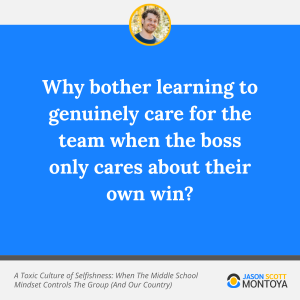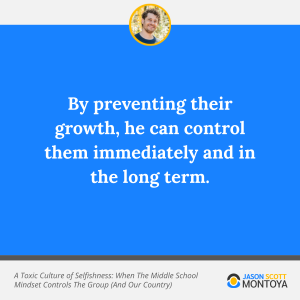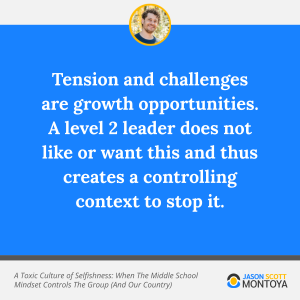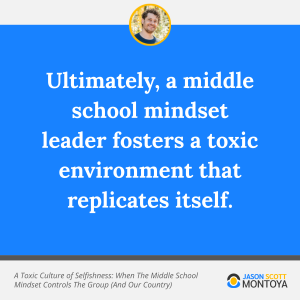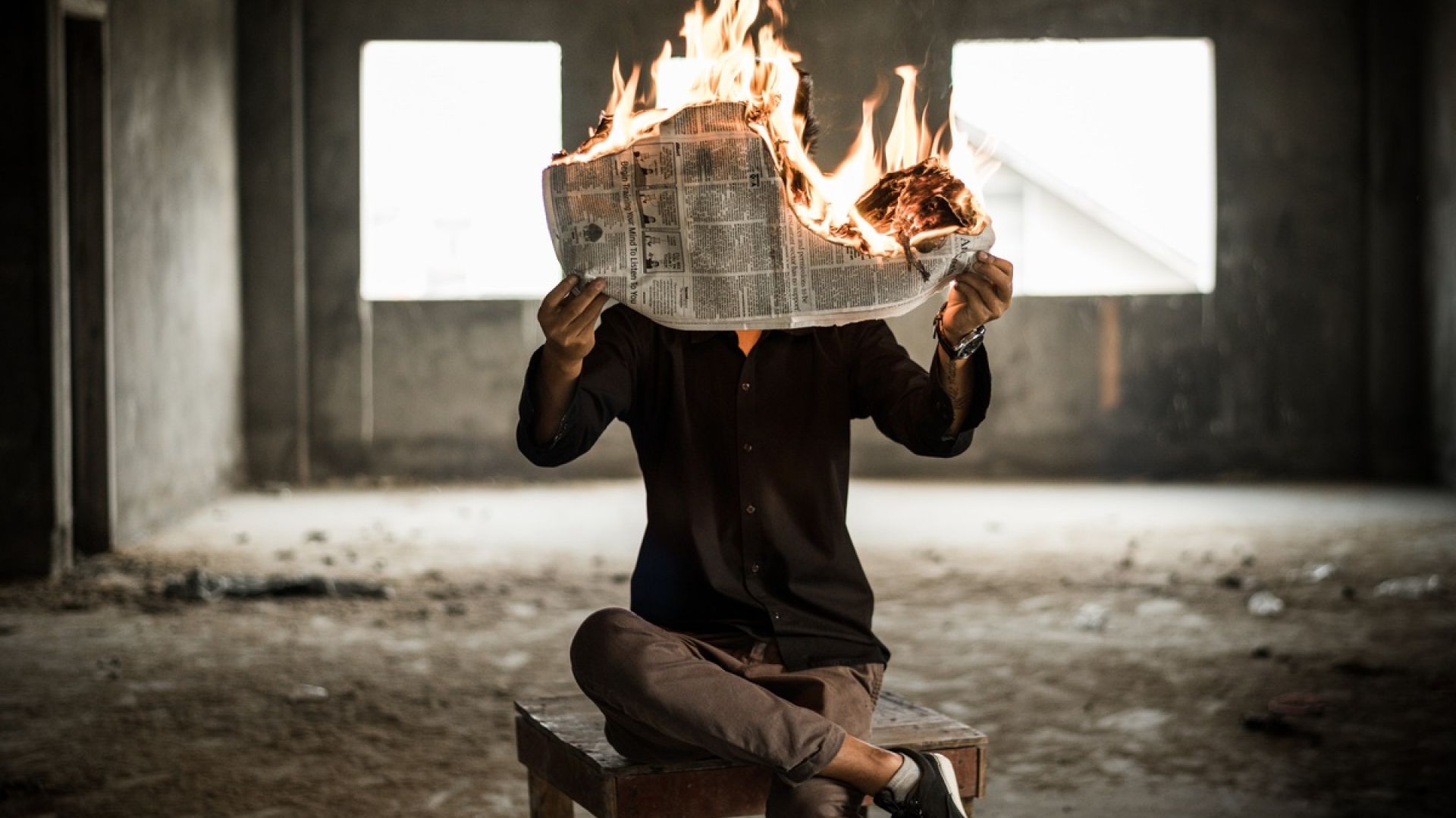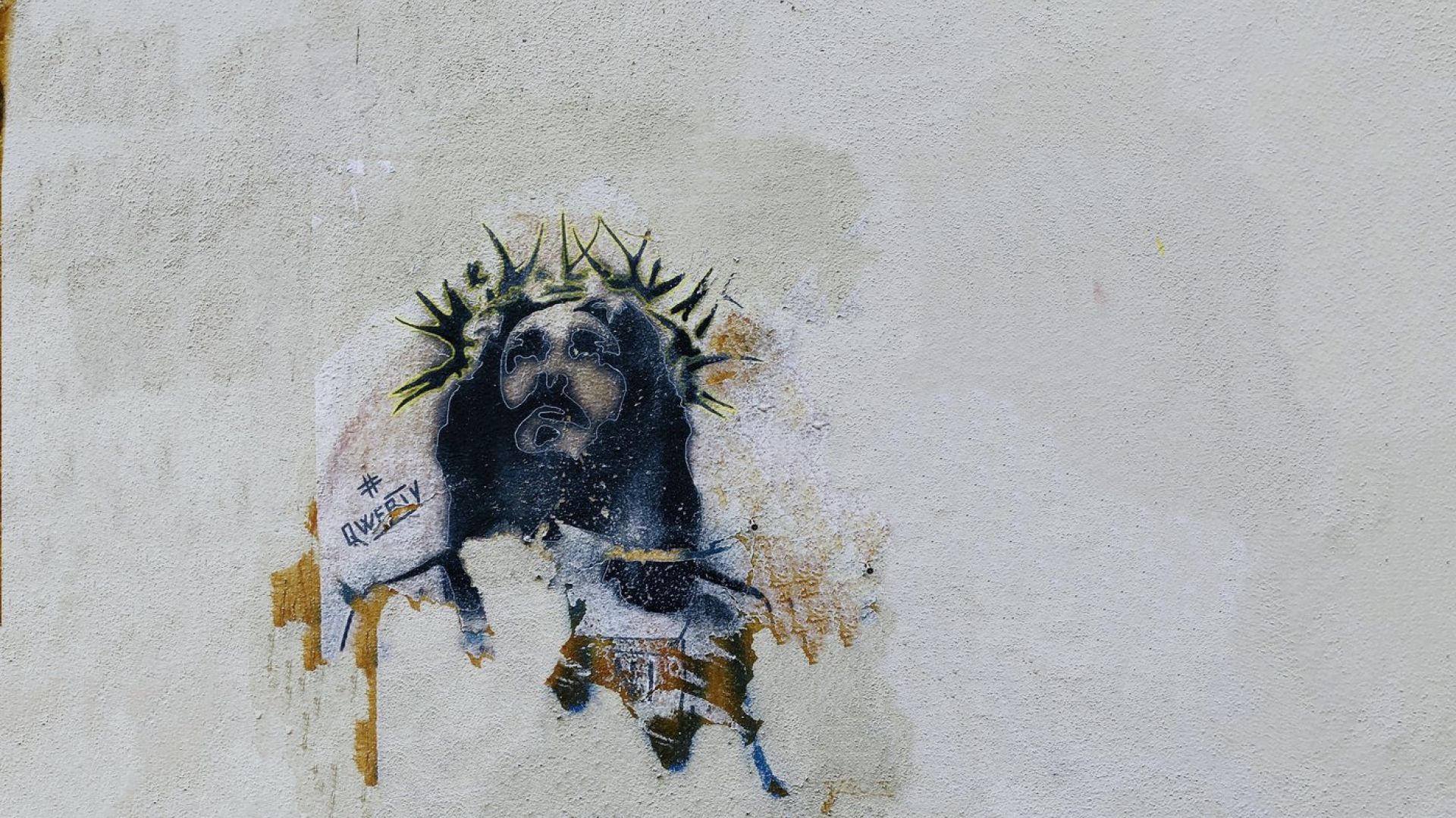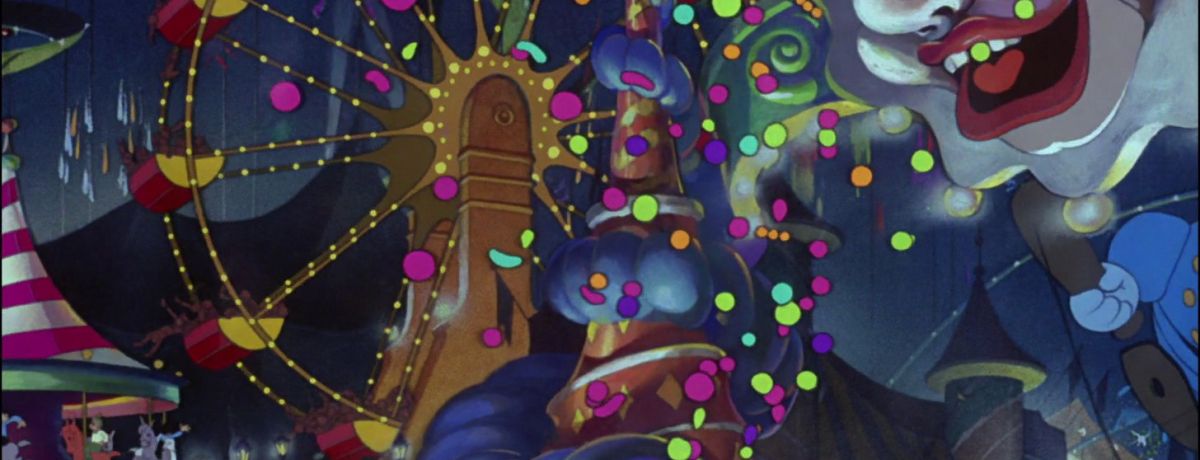
A Toxic Culture of Selfishness: When The Middle School Mindset Controls The Group (And Our Country)
"What is causing the quarrels and fights among you? Don’t they come from the evil desires at war within you? 2 You want what you don’t have, so you scheme and kill to get it. You are jealous of what others have, but you can’t get it, so you fight and wage war to take it away from them. Yet you don’t have what you want because you don’t ask God for it. 3 And even when you ask, you don’t get it because your motives are all wrong—you want only what will give you pleasure." - James 4:1-3
What happens when an adult leads a group or society with a middle school mindset (someone who never matured out of a self-interested mindset that can't separate themselves from their desires)? How does this type of leader change the group dynamics and incentives?
Ultimately, they foster a toxic environment that replicates itself. And when the wolves get into the hen house, they start breeding because this middle school mindset leader shields their followers from the necessary tension that fosters growth. They instead create a culture of self-interest and exploitation.

Life is Hard. Business is Challenging. The World is Uncertain.
Leaders, freelancers, and entrepreneurs: Get stories & systems, for navigating the challenges, in your inbox.
In this essay, I'm delving into the group dynamics of human development using Constructive Developmental Theory by Robert Kegan, as it relates to a level 2 individual accruing power and leveraging that power to subordinate others. If you're not familiar with these stages of human development, you can watch the following clip from my conversation with Julia Starr.
What type of group culture does this middle school mindset (level 2, imperial mind) individual create? And how do they subordinate people who are more mature than they are? If you look back to your middle school experience and apply that at a national level, you'll start to see the picture I'm about to paint (everyone is 12, as the meme goes).
In this article, we'll focus primarily on level 2 (the self-sovereign or imperial mind) and level 3 followers (the socialized mind), and we will save the discussion of level 4 (self-authored) followers for a future post.
An Unexpected Backward Dynamic
As we explore these group dynamics, it's important to recognize that standard expectations can get flipped upside down. Normally, when a child is growing up, the parents should be more mature and make better decisions. Grandparents should be the wisest of them all.
As my political party (Republicans) has been taken over by the middle school mindset, they've become quite childish. Many of the conversations I've had with people much older than me form a weird, flipped dynamic where they're acting like a child and I'm having to be the more mature adult. It's unexpected to talk to people 10, 20, or 30 years older than me who act like someone 10, 20, or 30 years younger than me.
This experience is not unique to me. Many people I know have had to deal with these types of flipped dynamics as it relates to politics with their parents and grandparents. For some reason, these people we once looked up to have failed to apply their espoused faith and values to their politics.
This dynamic can be explained in a few ways, one of which is that we've surpassed them in our level of maturity, and they arrested their development (they stopped growing up). Also, group dynamics can make someone appear and act at a higher or lower level of development than they are internally. Because those at levels 2 and 3 are more deeply affected by outside forces, group dynamics can amplify or suppress what's going on. Simply put, we may be missing what truly motivates people and drives their behavior.
One of the most important questions for each person in each growth stage is to ask themselves, what's the line that if your political leader and political tribe crosses, you will pull back your support and stop defending them? What line crossed will lead you to stop teaming up with them? To leave that tribe (and find another)? What line crossed would lead you to re-evaluate your ideology?
These are the types of questions that lead to self-authoring, but also the types of questions that an imperial-minded group does not want to face. Let's dive into a historical example.
The Kids in the Gulag Archipelago
Before diving into the specifics of how an imperial mind (level 2) leader shapes a group of imperial and socialized minds, I'd like to share a powerful example of the level 2 stage of development as a group dynamic. Years ago, when I read The Gulag Archipelago (affiliate link), I bookmarked a chapter titled; The Kids. This part of the book was a powerful example of these types of dynamics manifesting sharply and clearly.
If you're not familiar with the book by Aleksandr Solzhenitsyn, the book is about the Soviet Union's concentration camps. And these prisoners included a large number of children and young adults. Here's the estimated count, the author gives.
"In 1927 prisoners aged sixteen (they didn't count the younger ones) to twenty-four represented 48 percent of all prisoners.
What this amounts to is that nearly half the entire Archipelago in 1927 consisted of youths whom the October Revolution had caught between the ages of six and fourteen. Ten years after the victorious Revolution these same girls and boys turned up in prison and constituted half the prison population! This jibes poorly with the struggle against the vestiges of bourgeois consciousness which we inherited from the old society, but figures are figures. They demonstrate that the Archipelago never was short of young people." - Aleksandr Solzhenitsyn, Gulag Archipelago, The Kids, p267
That insight gives you a picture of the number of young people in these prison camps. At this age, under these hostile conditions, it's a recipe for amplifying these imperial mindset dynamics. These children also entered the camps with a worldview. Here's how it's described.
"They grew into camp life so swiftly—not in weeks even, but in days!—as if they were not in the least surprised by it, as if that life were not completely new to them, but a natural continuation of their free life of yesterday.
...it had not been the children of secure and powerful parents who had gone out to clip stalks of grain, filled their pockets with potatoes, been late at the factory gate, or run away from Factory Apprenticeship Training.
The kids were the children of workers.
Out in freedom they had understood very well that life was built upon injustice. But out there things had not been laid out stark and bare to the last extremity; some of it was dressed up in decent clothing, some of it softened by a mother’s kind word.
In the Archipelago the kids saw the world as it is seen by quadrupeds: Only might makes right! Only the beast of prey has the right to live!
That is how we, too, in our adult years saw the Archipelago, but we were capable of counterposing to it all our experience, our thoughts, our ideals, and everything that we had read to that very day.
Children accepted the Archipelago with the divine impressionability of childhood. And in a few days children became beasts there! And the worst kind of beasts, with no ethical concepts whatever.
The kid masters the truth: If other teeth are weaker than your own, then tear the piece away from them. It belongs to you!" - Aleksandr Solzhenitsyn
There are few better descriptions of how level 2 thinking can manifest and play out in a toxic group dynamic like these Soviet Union prison camps.
And, here's an example of how the level 2 mindset was let loose in the camps.
"There were two basic methods of maintaining kids in the Archipelago... Both were equally successful in developing animal viciousness. And neither rescued the kids from being educated in the spirit of the thieves’ ideals.
Take Yura Yermolov. He reports that when he was only twelve years old (in 1942) he saw a great deal of fraud, thievery, and speculation going on around him, and arrived at the following judgment about life: “The only people who do not steal and deceive are those who are afraid to."' - Aleksandr Solzhenitsyn
"As for me—I don’t want to be afraid of anything! Which means that I, too, will steal and deceive and live well!
...Yura Yermolov quickly mastered the thieves' law. The spirit of his existence spiraled upward steeply—and at the age of fourteen he had executed his "negation of a negation"; he had returned to the concept of thievery as the highest and the best of all existence." - Aleksandr Solzhenitsyn
It's a middle school mindset that channels fearlessness into immoral behavior.
How did this group dynamic play out in the camps? How were these children controlled? And how did they respond?
"There was even more injustice than in freedom. The chiefs and the jailers lived off the state, shielded by the correctional system. Part of the kids' ration went from the kitchen into the bellies of the instructors. The kids were beaten with boots, kept in fear so that they would be silent and obedient."
The simplest reply to the overpowering injustices was to create injustices oneself! This was the easiest conclusion, and it would now become the rule of life of the kids for a long time to come (or even forever).
But here is what's interesting! In giving the cruel world battle, the kids didn't battle against one another! They didn't look on each other as enemies! They entered this struggle as a collective, a united group!
... This is a descent into the law of the thieves! After all, the thieves are united; after all, the thieves have their own discipline and their own ringleaders. And the juveniles were the apprentices of the thieves, they were mastering the precepts of their elders.
No one could avoid being cooked up in that mash! No boy could remain a separate individual—he would be trampled, torn apart, ostracoded, if he did not immediately declare himself a thieves' apprentice.
And all of them took that inevitable oath...
Who was the enemy of the kids in the children's colonies? The jailers and the instructors. The struggle was against them!" - Aleksandr Solzhenitsyn
That struggle did foster a form of unity. Some key insights from these passages include the tragedy these kids experienced, the descent into the law of thieves, and the inevitable oath of unity against a shared enemy.
That captures many dynamics of the middle school mindset, but I want to highlight one other passage that connects to the level 3 mindset, the socialized mind. This comes from the end of the chapter titled, The Kids With Tommy Guns.
"This is surely the main problem of the twentieth century: is it permissible merely to carry out orders and commit one's conscience to someone else's keeping? Can a man do without ideas of his own about good and evil, and merely derive them from the printed instructions and verbal orders of his superiors? Oaths! Those solemn pledges pronounced with a tremor in the voice and intended to defend the people against evildoers: see how easily they can be misdirected to the service of evildoers and against the people!" - Aleksandr Solzhenitsyn, The Kids with The Tommy Guns, p385
That perfectly captures the dynamic of level 3 individuals inside that toxic group. Those in this socialized mind find their identity and values (belonging) in the group (or groups) of which they identify most. These passages introduce us to the earlier outside-in stages of adult development in a highly stressful and deeply corrupting context. But let's pin these ideas down into a more specific understanding of the dynamics.
The Psychological Perspective of These Group Dynamics
In America, we have a situation where the country has elected a Middle School Mindset individual to lead (Trump). We want to explore how the level 2 leader shapes the group dynamics and the followers in that group. And, how does this imperial-minded leader trap those in the group while also controlling them?
Here's how Google Gemini describes the dynamic as it relates to Constructive Developmental Theory.
"Developmental transition (moving from Level 2 to Level 3, or Level 3 to Level 4) happens when an individual's current way of making meaning is no longer sufficient to solve the complexity of their reality—this is the "disorienting dilemma."'
A Level 2 leader effectively shields subordinates from these dilemmas in two key ways:
- By Validating Level 2 Transactionalism (Impeding Growth to Level 3, belonging)
- By Demanding Level 3 Loyalty (Blocking Growth to Level 4, self authoring)
The middle school mindset leader, who is in a position of authority, traps both level 2 and level 3 individuals, retaining power in an extractive sense. Think of it like the mafia boss extracting value from those under its thumb as part of a protection racket. By preventing their growth, he can control them immediately and in the long term.
Let's dive deeper into how the level 2 tyrant does this for each of these two sub-groups.
Group Dynamics: Level 2 Followers
Let's start with fellow level 2 followers of the level 2 leader. These are middle school mindset people led by a middle school mindset.
Here's how Google Gemini describes these imperial minds (level 2) in this group dynamic.
By Validating Level 2 Transactionalism (Impeding Growth to Level 3) The Level 2 Leader Maintains Control: The Level 2 leader models and rewards the very mindset the developing person is supposed to transcend.
This is toxic and scary when manifested at the societal level. If the only thing that matters is the leader winning the moment, you do whatever it takes to help him win, even at the cost of the people you work with. In light of the insight about punishing empathy, it is also quite interesting how many belief systems are being created in the Republican Party right now to make empathy a bad thing and a value they should reject. Those propagating this message are participating in the suppression of the very thing these level 2 individuals need to mature.
And, as it relates to emphasizing transactionalism, one of Trump's superpowers is his uncanny ability to swiftly punish and reward his followers in the direction of what he wants most. He can simply use his thumbnails to post a tweet to keep his followers in line and satiate their desire to see their enemies punished.

Trapped Socialized Minds (Level 3)
“…people decide what to believe by deciding who to believe. Huemer offers advice on identifying reliable public intellectuals." - Arnold Kling, Seeking Truth versus Seeking Esteem
Let's talk about the level 3 individuals, who do have the capacity for empathy. Like that plate that fits, but doesn't belong there, many people in level 3 are seeking belonging in toxic groups, including a large swath of the Republican party.
"As others have noted, some of Trump’s sins against democracy are so quintessentially monarchical that they appear in the bill of particulars against George III in the Declaration of Independence. If you can digest all of that and still end up scratching your head at what the “No Kings” demonstrators were on about, it’s not because you don’t understand. It’s because you won’t understand. You’ve resolved psychologically not to take Trump’s autocratic desires seriously because doing so would force you to choose between loyalty to your tribe and loyalty to the Founders’ vision." - Nick Cattogio, The Last Hostage Crisis Will the ‘third term’ chatter backfire on Republicans?
Breaking belonging for level 3 individuals feels catastrophic. This tension allows for their complete control. Most people in the Republican Party who are in level 3 are trapped, unable to step outside of their families, communities, and affiliations because they'd have to move into an antagonistic position within their tribe. Tragically, this courageous step risks the belonging they want and need. It also fuels those in the group to do what they can to stop people who want to leave. If someone leaves, it also threatens the belonging of those who stay. Either way, it truly requires a level of self-authorship to step out in such a monumental way.
One cheat code would be to move into other social groups that have different sets of values, but that can also be problematic (if the new group has its own toxicity), as they'll simply be reshaped by the new group in a different but still broken way.
Let's explore this trap dynamic, psychologically. According to Google Gemini, here's how the level 2 leader traps and controls those in stage 3 of development. It's an ironic twist that level 3 individuals struggle (as they are further in their maturity) when a group is taken over by a level 2 individual.
Here's how.
By Demanding Level 3 Loyalty (Blocking Growth to Level 4) The Level 2 Leader Maintains Control: While the Level 2 leader reinforces transactionalism, they also selectively value Level 3 loyalty, which creates a ceiling on developmental growth for most people.
Tension and challenges are growth opportunities. When we embrace and reflect during these times, we have the most opportunity for growth. A level 2 leader does not like or want this and thus creates a controlling context to stop it. And it maximizes the consequences for not being a good, loyal soldier, speaking truth, or considering their departure.
As a level 3 individual, it's quite difficult to operate under the pressure of allegiance. It's like Superman trying to fight someone while they're holding kryptonite. The level 3 individual wants belonging and has to face losing that value or conforming to the group (a less risky and painful path). And such, they are incentivized not to think, and to do what they're told.
“Someone loyal and devoted to the regime has actually zero incentive to understand anything, the only possible motivation to notice things is if you are actively fomenting a rebellion. Therefore, those in power must be actively punishing those who notice and understand. They are traitors, or will be traitors, or useful idiots for the traitors. For calling things by their names (as the traitors do) always carries a grain of resentment and the opposition to the existing order of things.“ Kamil Kazani, On the art of not understanding things
Cult expert Stephen Hassan talks about the dynamic of thought-stopping and being told what to believe. These are tactics designed to keep people in their current stage without growing into a self-authoring adult (a highly threatening force for a controlling group).
When people do move into these stages of growth, they are quickly ejected and villainized. This is what's going on with the following observation.
In 2024, only 33% of Republicans agreed the president should have the right to hire only officials who agree with their policies.
— Richard Hanania (@RichardHanania) October 22, 2025
Now it’s 64%.
Democrats stayed consistent
So much Republican politics is justifying whatever Trump happens to be doing today. pic.twitter.com/xjP5HuMHVr
"So much Republican politics is justifying whatever Trump happens to be doing today." They don't want alienation, and they want belonging. Going along with the lies and corruption is how they keep their community together (but it's a fake facade that will eventually break down).
I'll make a quick parenting note here. This is why I think making obedient kids a focus can be problematic. It positions them to be exploited by these types of leaders and group dynamics, unable to escape them when they inevitably face them.
Controlling the Group
We can easily overlay these explanations for how Trump has hijacked the Republican Party and subjected its members to his utmost allegiance. And it helps to explain how Republicans ejected anyone who would not go along with Trump, a person who requires ultimate allegiance (or at least the appearance of it).
What's happened in the Republican Party and now America, and what Trump is offering his followers, is an escape from the tension people are feeling that requires growth to transcend. Instead of facing the tension and growing, which is hard, Trump is providing an off-ramp (which imposes severe consequences on others without actually relieving his followers of the pressure). But this escape is not actually an escape; it's a trap.
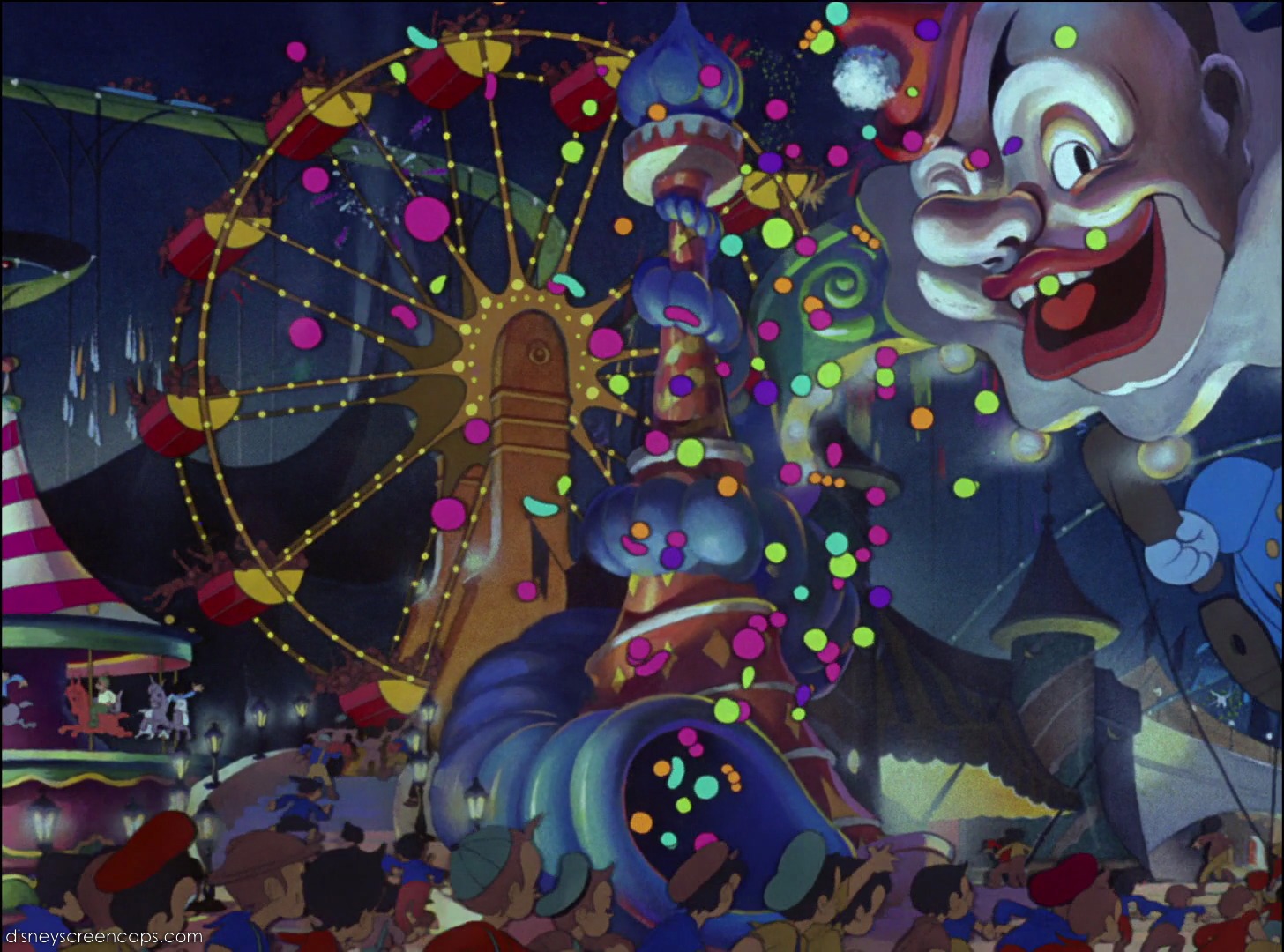
The visual that comes to mind is Pleasure Island, at the end of Disney's Pinocchio. The young boys are promised everything they want on Pleasure Island, only to discover the island is simply a place for them to be transformed into jack-asses and then sold and shipped off, as they are no longer needed.
The solution, ultimately, is to go against the grain and move towards self-authorship. This requires thinking for ourselves and figuring out what values and principles we're going to embrace, even when everyone else is pushing a different direction. But when we're caught in that transition space between level 3 and 4, it can be hard to hold strong. Oz Chen describes a situation where he regressed from his principles when the pressure got too hot.
"I was experiencing huge changes at work and in my career identity. I felt stress and uncertainty.
And so I used trading - and the thin promise of quick money - to deal with my external stresses, instead of dealing with the source of that stress directly." - Oz Chen, The male tendency to trade stocks under stress
He regressed when the uncertainty arose. Instead of embracing the old way of life, we've got to let the tension be an opportunity to keep growing forward. But it is hard. And sometimes the consequences of regression are required to finally give us the motivation to move forward instead of backwards.
This pivot to self-authorship is key. Here's how Google Gemini describes the level 4 leader inside this toxic group dynamic who doesn't compromise their values.
"The Principled Exodus: Those Level 4 individuals who refuse to regress (or abdicate their judgment) face the ultimate disorienting dilemma: their choice is between their professional principles and their livelihood/access to power. They often choose the former, becoming "Never-Trumpers" or dissidents, thus self-selecting out of the system. This leaves the system almost entirely populated by Level 2 and Level 3 mentalities."
So, we must resist and keep moving forward to level 4. Julia Starr explains this shift from level 3 to level 4 in a clip from our conversation about the growth journey. She provides the antidote for the members of the group, as well as those who love them.
But it's important to note that the exodus of level 4 leaders means a large absence of principles and competence.
"Tyranny might get you compliance, but it will never get you loyalty, or truth, or anyone’s best." - Jordan B. Peterson
Simply put, things will get bad and keep getting worse in complex areas of society until enough people intervene in the most effective ways possible.
“Trump is surrounded by loyalists who tell him what he wants to hear. Few have deep experience in crisis management. Many have shown themselves to be unqualified, self-interested, or openly hostile to democratic norms. If his administration is tested by large-scale disasters or national protests - and it will be – it’s going to respond slowly, defensively, and ineffectively.“ - Barbara Walter, #4: Storms and Streets Break Regimes
Share Key Quotes on Social Media
